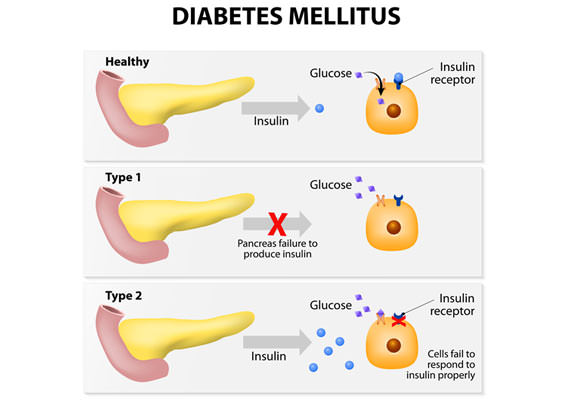Would you take a weight-loss pill that made you gain weight? Or a sleep aid was loaded with caffeine that kept you up all night? Of course not! And your …
Vitamin That Prevents Diabetes
Researchers have discovered a direct link between low vitamin D3 levels and insulin resistance, pre-diabetes and full-blown type 2 diabetes.1 The study, which came out of Harbin Medical University in …
This Vitamin Can Save Your Brain
Your brain has amazing abilities. And it can heal itself. That’s not something you’re likely to hear from mainstream medicine — especially if you or a loved one suffer from …
Vitamin D3 is Better Than Drugs For Depression
I’ve been banging the table about the healing power of vitamin D3 for years. This fat-soluble vitamin is one of the core “primal” nutrients that kept our ancestors strong, potent, …
The Vitamin That Defeats Dementia…
Technology is a gift, and I appreciate all the options we have today that our ancestors could not even imagine. But there’s a price that comes with it. Toxins from …
This Vitamin Could Save Your Life
For years, I’ve recommended that my patients take a special family of super-nutrients with the power to boost their health and save their lives in at least a half a …
Nothing a Good Dose of Vitamin-C Can’t Cure
We have plenty of scientific evidence that proves the value of nutrients and health supplements … but look at what happens when you take that evidence to a standard doctor.A …
Nothing a Good Dose of Vitamin-C Can’t Cure
We have plenty of scientific evidence that proves the value of nutrients and health supplements … but look at what happens when you take that evidence to a standard doctor.A …
“Stop wasting money on vitamin and mineral supplements.” (Is he joking?)
It’s hard to believe in 2014. But it’s still going on. Every so often I’ll read or hear a doctor or professional organization say there’s no evidence that a vitamin …
Vitamin by Any Other Name?
Those diet dictocrats are at it again… We have strong evidence that there’s a nutrient that really should be classified as a vitamin. Why don’t you know about it and …
More Than A Vitamin
I’ve been telling you stories and showing you photos from my trips through the rainforests in Africa. So it wouldn’t surprise me if you have the impression that I haven’t …
Lab Creation Loose in Your Vitamin E
It’s a shame that journalists with no medical knowledge keep trying to scare you about vitamin E.
First they reported vitamin E caused lung cancer, and now it’s prostate cancer.
One patient of mine who had prostate cancer, John M., wrote me saying, “Help! I take 600 IU a day. I am in the middle of pouring through the information and am wondering… could it possibly be that the push for this vitamin has lead to prostate cancers? I am perplexed.”
Today I want to help you cut through this mess, and show you what’s really going on with vitamin E, and how you can benefit the most from it.
It is Not Vitamin A, It is Not Beta Carotene…
First, Elmer McCollum couldn’t get a job.
He had a doctorate from Yale, but couldn’t find work in his field. It was only after a long time searching all over the Midwest (he was from Kansas) that he even got hired.
The University of Wisconsin took him on as an instructor. But he had to switch his field of study because that was the only way he could get a position.
Then, the school wanted him to look at the diets of grain-fed cows to find out why they were dying or giving birth to malformed calves.
After all, grain contained everything that chemists, physiologists, and medical men considered essential… even thought it was obviously not enough to sustain the cattle’s lives.
But McCollum felt the cows weren’t getting enough nutrition from grain. He had to go against convention and the people who wouldn’t listen to him to find his answer. He stopped doing cattle research and set up his own lab to study nutrition in smaller animals.
It took him more than two years, but in 1913 he discovered what he called “fat-soluble A.” You and I call it vitamin A.
But that’s not the reason I’m telling you this story. The reason I want you to know about this is because this is still happening today.
How I Know My Vitamins Are Natural
Did you know that every vitamin you take can be measured in your blood?
This led to a surprise for me early on in my career. When I started testing vitamin levels in the bloodstream of my most health-conscious patients, even the ones who swore they took a multivitamin every day, they were malnourished!
I had to do some researching to understand why.
Here’s what I learned:
How I Get My Winter Vitamin D
We all know sunshine is the cure if you don’t get enough vitamin D in your diet, right? Well, not so fast … sunshine isn’t always enough.
The problem is that even when it’s sunny you might not get enough vitamin D. In a study from the city of Calgary – one of the sunniest places in Canada – almost every person measured had a vitamin D deficiency … 97 percent of them!1
And in Australia, one of the sunniest places on earth, an osteoporosis study found over 43 percent of people had low vitamin D levels during the winter.2
How I Get My Vitamin B12
I kept seeing the same story over and over. Almost 70 articles on the same study… and each article with nearly the same headline: “Vitamin B12 Can Prevent Alzheimer’s.”
Don’t get me wrong… it’s true, and it’s a great thing. But it’s not really news. We’ve known the benefits of B12 for years. To me, the real importance of the study is that it deals one more body blow to modern diet recommendations, which tell us that protein and fat are the enemies of good health.
Are You Taking the Right Vitamin E for Your Heart?
I see a lot of reports and read a lot of studies on vitamin E. You may have, too.
Like the study where researchers gave athletes only 200 mg of vitamin E for only 21 days and concluded that vitamin E has no cardiopulmonary benefit.
Or how about the group of researchers who looked at 11 high-dose vitamin E studies and concluded that the more vitamin E you take, the greater your risk of dying?
Another you may have heard of is the lung cancer study where researchers found multivitamins, vitamins C, E and folate don’t reduce lung cancer risk. But that vitamin E may increase your risk.
If you conclude from this that researchers are out to get vitamin E, I wouldn’t blame you…
"Red Wine Vitamin" Zaps Wrinkles
Researchers recently discovered a surprising new benefit of red wine…
It contains a powerful ingredient that can help you change the appearance of aging of your skin.
You may have heard of it. We’ve known for years it supports your heart and may help you live longer.
Now, ongoing research shows resveratrol helps you maintain younger-looking skin.
Did you see the resveratrol story on “60 Minutes”?






